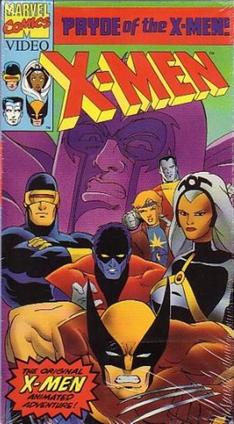Plot
The X-Men's archenemy Magneto is being transported by a military convoy. Magneto is unable to use his powers, trapped in a force field, until he is freed by the White Queen, a member of his "Brotherhood of Mutant Terrorists", allowing him to use his magnetic powers to tear apart his portable prison and escape.
Elsewhere, Kitty Pryde arrives at Professor Xavier's school to begin training her phasing powers, allowing her to pass through solid matter. In the Danger Room, Kitty is introduced to the X-Men: Cyclops, Colossus, Dazzler, Nightcrawler, Storm, and Wolverine. Frightened by Nightcrawler's demonic appearance, Kitty almost causes the Danger Room to go haywire, making Wolverine protest her recruitment.
Magneto sends Pyro and Blob to retrieve the tracking coordinates for the Scorpio comet approaching Earth, with the secondary goal of distracting the X-Men while Magneto and Juggernaut invade the X-Mansion. Xavier reads Magneto's thoughts, learning that they seek to steal the "mutant power circuit" of Cerebro; he gives it to Kitty and orders her to flee, but Magneto manages to capture it.
The X-Men return from their confrontation with Blob and Pyro to find the mansion in ruins, and the Professor and Kitty unconscious. Xavier reads Magneto's thoughts again and learns his full plan: to redirect the Scorpio comet onto a collision course with Earth and plunge the planet into another ice age, which would leave normal humans weakened, allowing the mutants to take over. The X-Men leave for Magneto's sanctuary Asteroid M, but the X-Men instruct Kitty to stay, as the mission is far too dangerous and she has not been trained. Kitty, wanting to prove her worth and make amends for her previous failure, phases aboard the Blackbird and hides, with Xavier's permission.
Upon reaching the asteroid, each X-Man meets an obstacle on the way to Magneto: Storm covers the breach the X-Men blow into Asteroid M, Dazzler takes on Pyro, Wolverine traps Toad, Colossus engages Juggernaut, and Cyclops battles White Queen. After teleporting past Blob, Nightcrawler confronts Magneto as the Scorpio comet approaches Earth. As Magneto is about to blast Nightcrawler, Kitty emerges from the floor, causing Magneto to accidentally blast the wiring of his device. Nightcrawler teleports up and uses his body as a conduct, while Kitty knocks Magneto onto the platform, using his power to redirect the comet's course towards Asteroid M. Nightcrawler must risk sacrificing himself to complete the machine's circuit, or the comet will change course back to Earth.
The X-Men watch from the Blackbird for Nightcrawler to teleport at the last minute. The comet and asteroid collide, but Nightcrawler rematerializes out in space. The team attempts to retrieve him with the Blackbird's grappler arms, but they miss, and he apparently disintegrates. While the X-Men mourn Nightcrawler, he emerges from a storage locker, revealing that he teleported himself into the plane before the atmospheric compression burned up his suit. While the X-Men give Kitty credit for her efforts, Wolverine insists that Kitty is not yet a member of the X-Men.
